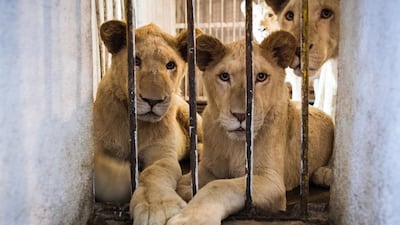KABUL // For years, the lions enclosure in Kabul Zoo has remained largely empty.
Nestled between green hills, the zoo was once home to Marjan, the famous one-eyed lion of Kabul – who survived nearly three decades of war, mujaheddin attacks and several regimes, only to die in his sleep in 2002 as the zoo was finally being restored to a semblance of its former glory.
Except for brief periods when it hosted a couple of older lions, the zoo has not been able to fill the enclosure despite numerous requests to various donor nations over the past decade.
But last month, its director Abdul Aziz Saqib saw reports on social media that some rare white lions had been rescued in Spin Boldak, a town on the border with Pakistan in the war-prone Kandahar province.
"The border police in Kandahar had captured an animal trafficker attempting to smuggle six young white African lions out of the country," Mr Saqib told The National.
He said the lions – three male and three female – were about two years old.
“They were found hidden under crates of fruits and were being held in deplorable conditions.”
He immediately contacted General Abdul Raziq, the popular chief of the border police in the southern province.
“He told me that the lions were in his safe keeping but were being housed at the local police station, and that he would be happy to hand them to the care of Kabul Zoo,” Mr Saqib said.
He and his team, some of whom have worked at Kabul Zoo for decades, have cared for it animals even at the height of the civil war in the 1990s.
“Over the last 13 years, we’ve pieced this zoo back together from its ruins and feel that it serves as an important role in educating and informing the Afghan citizens about our environment,” said Mr Saqib.
Their dream has always been to repopulate the wildlife park, especially with a wild cat or two.
Mr Saqib said the border police told him the lion cubs were smuggled into Afghanistan by a local businessman who had kept them in the country for 11 days before attempting to send them across the border to Pakistan.
“He claimed that he had the required licences to import the wild, endangered beasts into the country; however, the government of Afghanistan does not provide any such licences. As far as I know, Afghan legislations prohibit setting up of a private zoo,” he said.
Trafficking of endangered and exotic animals is a recurrent problem in Afghanistan.
Affluent Afghans often see the possession of rare, and sometimes dangerous, animals as prestigious.
In 2014, a malnourished lion was brought to the zoo after being rescued from a suburban home in the Taimani area of Kabul where it had been kept on the roof and fed an unsuitable diet. The lion was renamed Marjan, after Kabul Zoo’s former one-eye resident, but was in such poor condition that it survived only six months.
In another case, Hashmat Karzai – the late brother of former president Hamid Karzai – kept a pet lion in Kandahar. Although well looked after, it was believed to have been obtained illegally.
Four of the white lion cubs rescued in Kandahar arrived at Kabul Zoo in the first week of April. The other two are still in Spin Boldak, waiting to join their siblings.
“Due to ongoing conflict in that district, it is logistically difficult to transfer the remaining two of the lions to their new home,” Mr Saqib said.
He is coordinating with authorities in Kandahar and the National Environmental Protection Agency, which deals with endangered animals in Afghanistan, to bring them to Kabul. In the meantime, Mr Saqib has advised the border police in Kandahar on how to look after the cubs and is confident they are being taken care of properly.
The four cubs that reached Kabul have been drawing crowds to the zoo and have become known as the “Lions of Kandahar”.
“I often come to the zoo, sometimes alone and sometimes with my family,” said one visitor. “These lions are so beautiful; I’m happy they are with the zoo and not in the house of some rich Afghan being used as garden ornaments.”
Mr Saqib agreed.
“These lions are an extremely endangered species and we need to respect and protect them,” he said.
“Sadly, when people see these lions being kept as pets, instead of being sheltered responsibly for education, it starts an unhealthy trend which results in more people wanting to smuggle and obtain animals.”
The lions have already developed an attachment to their caretaker, Qurban Ali.
Mr Ali has more than 15 years of experience working with lions and tigers in Pakistan and was brought to Kabul Zoo specially to care for the Lions of Kandahar.
“They are so playful and affectionate, and I am so glad they are part of the zoo,” Mr Ali said, as he summoned them to the feeding area for their next meal. The lions dutifully followed the sound of his whistles – and even let him rub their backs through the bars of the feeding cage.
Asked why he chose such a risky job, Mr Ali said simply: “I love animals because they are a gift of Allah.”
foreign.desk@thenational.ae

